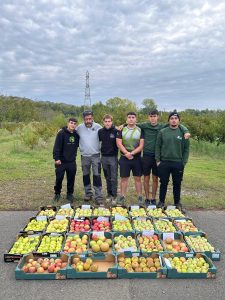CASE STUDY: SOIL REVITALIZATION PROJECT IN A TRADITIONAL APPLE AND PEAR ORCHARD

Photo acknowledgement: “Gamta mieste”
- Vocational
- Outdoor
- Demonstration site / trail, Farm, Gardening / school garden / allotment
- Spain
SOIL REVITALIZATION PROJECT IN A TRADITIONAL APPLE AND PEAR ORCHARD
The Agricultural School of Alfarràs in Spain is home to a collection of traditional apple and pear varieties, including 43 apple varieties and more than 50 pear varieties. These varieties, which originate from Alta Ribagorça and are provided by the Institute of Agrifood Research and Technology (IRTA), represent an important ethnobotanical heritage. Many of these varieties were once familiar to our grandparents and great-grandparents, with unique colours, flavours, aromas, and textures that differ significantly from the commercial varieties commonly found in supermarkets.
Initially, these fruit trees were planted in soils that were not ideal for their growth, which hindered both their development and yield. In 2019, the Organic Plant
Production professor at the school began a project to revitalise the soil with the help of students, incorporating organic matter, microorganisms, and biodiversity to improve soil conditions.
Objective
1. Assess soil fertility and monitor its evolution through various interventions, using tools such as soil chromatography and bioindicator plants.
2. Establish the production of traditional apples and pears as a model for disseminating knowledge about sustainable farming practices.
3. Provide a practical example of how soil fertility and biodiversity can enhance the quality of agricultural products and reduce production costs. This includes
minimising the need for agrochemicals, such as chemical fertilisers and pesticides.
Approach
This project not only focuses on restoring soil health but also seeks to revive forgotten traditional fruit tree varieties. It demonstrates that agriculture can be practised sustainably by optimising water use, avoiding synthetic chemicals, and producing food with superior nutritional quality.
The approach aims to enhance soil fertility, linking it with:
– Water conservation through efficient irrigation practices
– Reduction in fruit tree diseases
– Improved product quality, with an emphasis on higher nutritional value in the fruit produced.
The soil’s progress is monitored regularly through soil chromatography and the observation of bioindicator plants, which provide insights into the changes in the soil ecosystem.
Over the past four academic years, the focus has been on soil recovery, and by 2022, students and staff were able to taste the fruit produced. In November 2023, the school hosted a technology transfer day, attended by students and industry professionals, during which an apple tasting session was led by Xavier Ferrer, an expert in traditional apple and pear varieties.
